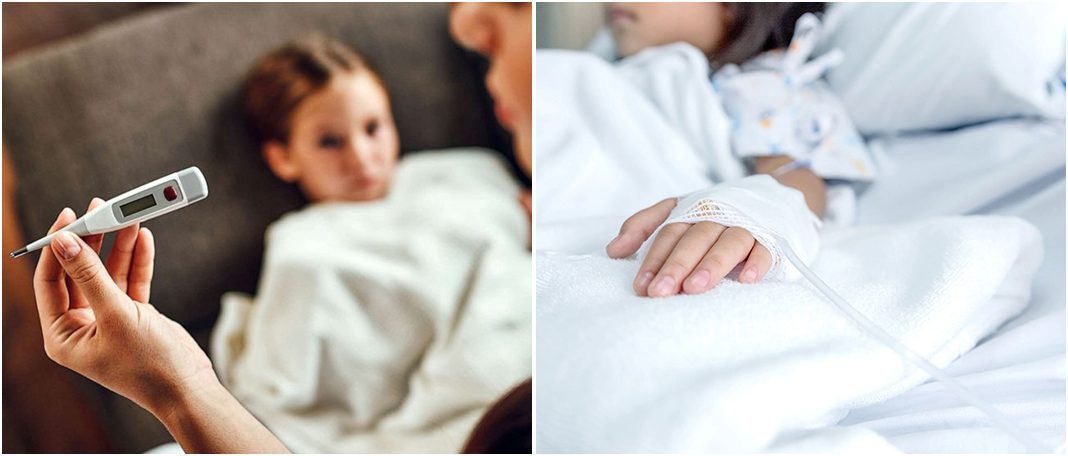Hepatitis is a liver inflammation caused by a virus infection also called viral hepatitis. The liver plays a vital role in processing nutrients, filtering the blood, and fighting infection. When the liver gets damaged, its function can be affected. In the United States, the most common types of viral hepatitis in children are
- Hepatitis A
- Hepatitis B
- Hepatitis C
These three types of hepatitis are affecting millions of people across the world causing short-term and long-term liver disease. According to the World Health Organization, there are 325 million cases of hepatitis in children worldwide living with chronic hepatitis B or chronic hepatitis C.
What is Hepatitis A?
It is caused by the virus Hepatitis A (HAV), a short-term disease usually transmitted by ingesting the virus after coming in touch with contaminated materials, food, or drinks from an infected person. Mostly it’s very common in children to get infected with hepatitis A and it does not cause liver damage. Infected people can recover soon if they don’t have a poor immune system or any other medical conditions.
Hepatitis A virus lives in an infected person’s poop, so it is very important to wash your hands before eating and also after using the restroom. Vegetables, fruits, and shellfish like shrimps harvested in unsanitary conditions or with contaminated water can also carry hepatitis
How to prevent Hepatitis A?
The following steps help you to be safe from hepatitis A:
- Regularly wash your hands before eating and also before using restroom facilities, even before diapering a baby.
- Wasting fruits and vegetables before eating them and eating raw shellfish is not recommended.
- Get vaccinated with hepatitis A vaccine.
Vaccination helps people be at safer hands, builds antibodies in the body to protect against hepatitis viral infection. It is recommended for one year age group children and it is also advised to get vaccinated even for people traveling internationally.
What is Hepatitis B?
Hepatitis B is caused by the hepatitis B virus (HBV), transmitted when infected blood, semen, or other fluids enters the body of another person. It is a serious long-term illness where about 90 percent of infants get infected after birth. It is also transmitted by needlesticks and sharp devices. Sharing razors and toothbrushes spread infection quickly to others. If a mother has this virus during pregnancy, there’s a chance of babies getting infected from the mother. It may even transmit by scratches, cuts, and domestic contact among children. Chronic hepatitis B does not show symptoms sometimes but leads to serious complications like liver cancer, cirrhosis (scarring of the liver) of kidney disease, and blood vessel problem.
What is Hepatitis C?
Hepatitis C is a contagious liver infection caused by the hepatitis C virus (HCV), causing both acute and chronic hepatitis. It is transmittable through blood contact from an infected person and first six months after a person gets infected, this phase is called acute hepatitis, there are no symptoms found during this period. Only mild symptoms are found for a few but are not recognized as liver infections. During this first phase mostly 15 to 40% heal completely with their body immune system but for some people, it persists for 6 months, this state is called chronic hepatitis C.
Over time, the liver in chronic hepatitis C gets increasingly inflamed and damaged. However, it differs from person to person. Within 20 years, severe liver scarring develops, and the liver stops functioning at a normal rate. In the next 30 years, cirrhosis will occur and liver disease grows slowly but not life-threatening problem in life.
How to prevent hepatitis B and hepatitis C?
Prevention for both hepatitis B and hepatitis care is similar. The following steps will help you to be safe from spreading the virus:
- Wear gloves when you handle bandages, tampons, or lenin
- Use sterile instruments for manicure or pedicure
- Use condom
- Always use condemns when having sex
- Cover cuts or wounds if exposed
- Never share razors, toothbrushes, nail care products, and pierced jewelry
- Avoid sharing chewing gums do not share pre-chew food with children
- Get hepatitis B vaccine HBIG (Hepatitis B immune globulin)
Hepatitis B infected people should get vaccinated HBIG vaccine soon within twenty hours to 2 weeks after being affected. Doctors recommend infants to take hepatitis B vaccines in a series of three shorts within 6 months and also teens younger than 19 years who have missed this vaccine earlier.
Hepatitis Symptoms in Children:
- Nausea and vomiting
- Fever
- Low appetite
- Light-colored stools
- Sore muscles
- Joint pains
- Jaundice
- Flu-like symptoms
- Abdominal pain
- Dark-colored urine
How does a kid get hepatitis is because of sharing objects, food etc, and also by being in touch with infected people. The pediatric hepatitis treatment involves getting vaccinated for hepatitis A and hepatitis B whereas there is no vaccine for hepatitis C. The goal of treatment is to avoid more liver damage, reverse current damage if any, and relieve symptoms. Most acute hepatitis disappears on its own.


















